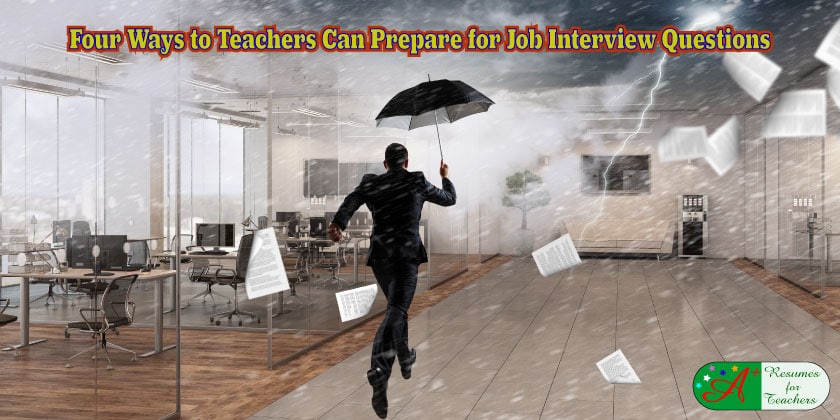Are you looking for ways to prepare for teacher job interview questions? I am sure you have put a lot of energy and investigation into writing your teaching resume and cover letter and finding methods to conduct a successful job hunt.
If all goes as planned, your phone will finally start to ring, and you will be asked to attend multiple interviews.
Principals, superintendents, and school district hiring managers are interested in you (based on your excellent teacher resume and top-notch credentials), so now is the opportunity to stand out!
The interview meeting is your key to career success. You can secure a job offer by selling yourself, your personality traits, teaching strengths, and relevant experience. These resume and cover letter samples may help you understand the school district’s hiring representatives’ current resume formatting, style, and content expectations.
The “worst nightmare.”
Numerous educators experience significant pressure when undergoing job interviews, often labeling the process their “most dreaded scenario.”
Rarely do circumstances arise that provoke as much anxiety, erode confidence, and magnify weaknesses as the job interview. Indeed, psychologists have equated it with public speaking in terms of its potential to induce stress.
However, interviews need not be a source of dread. With diligent preparation and strategic approaches, individuals can transform the interview experience into a valuable opportunity for growth and success. By honing communication skills, researching the prospective employer, and rehearsing responses to common questions, candidates can cultivate confidence and competence, turning their “worst nightmare” into a manageable challenge.
The mental replay
Have you ever left an interview, replayed the conversation in your head, and realized all the things you wished you’d said? It’s a common scenario: the “should have mentioned,” “could have explained,” or the dreaded “I forgot to say that.”
Don’t fret; you’re in good company. These post-interview revelations happen to the best of us, and we often find ourselves in similar situations during everyday interactions. Fortunately, there’s a remedy: your follow-up letter.
Your post-interview communication provides a golden opportunity to address missed points, clarify responses, or provide additional information. So, if something important slipped your mind during the interview, don’t worry—there’s still a chance to make it known.
Knowing your strengths
Mastering a fruitful teacher or principal interview hinges on understanding oneself, highlighting achievements, demonstrating suitability for the role, and illustrating one’s contributions to the school community. Prior preparation in refining interview skills is essential for conducting a successful job interview.
- Catalogue the attributes and competencies that align with the job requirements. Be ready to furnish instances from your professional background where you applied these skills and attained accomplishments through their utilization.
- Develop a list of questions you may be asked during the interview, and prepare your answers. Use the questions in this guide and develop your own well-thought-out and concise responses.
- If possible, practice answering potential job interview questions by conducting a mock interview with a friend or family member and getting feedback about how well you did. If you need an interview coach to help prepare, click here for the coaching service pricing.
-
Prepare a list of questions you intend to ask the interviewer. Remember, an interview is a dialogue, allowing you to inquire about various aspects. Asking questions serves a dual purpose.
Primarily, it signals your genuine interest in the school district and the teaching role, demonstrating your thorough research and ability to pose insightful, compelling, and pertinent queries. Additionally, their responses aid in deciding whether to accept the position if offered. Note: This isn’t the appropriate time to inquire about benefits and vacation; such queries are better suited for post-offer discussions.
Knowing Your Weaknesses
You’ll probably be asked this, too: “What’s your number one weakness?” A word of advice: don’t let it be something you’re not actively working to correct or crucial to the job’s essential functions.
For example, if you say that managing time and projects is a problem for you, a school principal will run for the hills. As a teacher, you’re responsible for creating lesson plans and adhering to a syllabus/curriculum while managing your students or young adults. Being a poor organizer could immediately disqualify you.
If you say that public speaking in front of adults makes you a little uneasy, that’s pretty common. If you can say that you recognized that weakness and did something to correct it — such as joining Toastmasters or taking webinars that enable you to practice — it’ll look like you know what you can bring to the table and what you must keep improving on. Brownie points for self-awareness!
Could you share some advice with other teachers preparing for an education job interview?
Share your most significant obstacle in the interview with other readers.
What questions did you find challenging?
Additionally, if you need help preparing for an extensive interview, Candace always helps job seekers with mock interviews. She can also polish up your job search documents! Contact her today to get a leg up on your peers.


